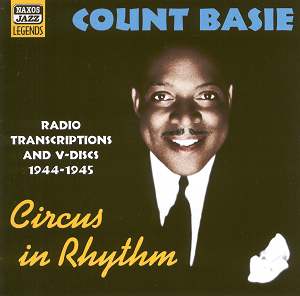1. Down For Double
2. Rockabye Basie
3. Rockin' The Blues
4. Do Nothing Till You Here From Me
5. Wiggle Woogie
6. Basie Boogie
7. Red Bank Boogie
8. Kansas City Stride
9. Circus In Rhythm
10. Gee Baby Ain't I Good To You
11. Basie Strides Again
12. Let's Jump
13. Tush
14. Jimmy's Blues
15. Taps Miller
16. Take Me Back
17. Baby
18. Just An Old Manuscript
19. Playhouse No. 2
20. Sugar Hill Shuffle
As a result of the Petrillo
recording ban there was a two-year gap in
American recordings. The ban ended in December
1944, by which time Basie’s star trumpeter
Buck Clayton and bassist Walter Page had enlisted
in the army. Their replacements were Sweets
Edison and Rodney Richardson and the 1944-45
band can be heard in this collection of transcriptions
and V-Discs, none of course susceptible to
bans as they were destined for radio station
use and for American servicemen overseas respectively.
The repertoire is a mix of
tried (and tested) and unusual. It’s unusual
to find Don Redman’s Just an Old Manuscript
after the 1940s and doubly good to find it
here. Elsewhere we find Jimmy Rushing and
Thelma Carpenter joining the band – Carpenter
sings the Ellington Do Nothing Till You
Hear From Me and Rushing sings three songs
long associated with him, all with his characteristic
ebullience and style.
Buddy Tate, replacing Herschel
Evans, always made a tonally and stylistically
fruitful section colleague for Lester Young.
Tate solos fluently and excitingly on. Rockabye
Basie. Earle Warren, altoist and section
leader, was an unusually modest player
unwilling to push himself forward, but
he solos frequently here. Eager and elegant
he marks one of the lesser-sung voices in
the band. By contrast Dickie Wells, one of
the supreme trombonists in jazz, proves urgent,
pungent and witty – that buzzy tone illuminating
everything he plays; his obbligato to Rushing
on Jimmy’s Blues is a killer. One of
the most unusual features of the band at that
time is the solo space given to Rudy Rutherford,
whose baritone work is embedded in the sectional
work but whose clarinet playing – whilst not
especially distinctive – represents one of
the underused features of the Basie band;
tenors were always to the fore with Basie,
unlike Ellington.
Lester Young’s influence
can be felt throughout; he takes some characteristic
solos, phrasing so far behind the beat that
he almost redefines the nature of swing. He
and Tate are not, perhaps, quite the two-tenor
team that Young and Evans were but they made
a formidable team nevertheless.
A number of the Lang-Worth
transcriptions have been issued before, if
not all of them. Music & Arts had a good
selection and other companies have made a
contribution toward presenting them in good
sound. With decent notes and good recorded
sound – no scrunch or detritus – Naxos’s fourth
Basie volume is an attractive proposition.
Jonathan Woolf
